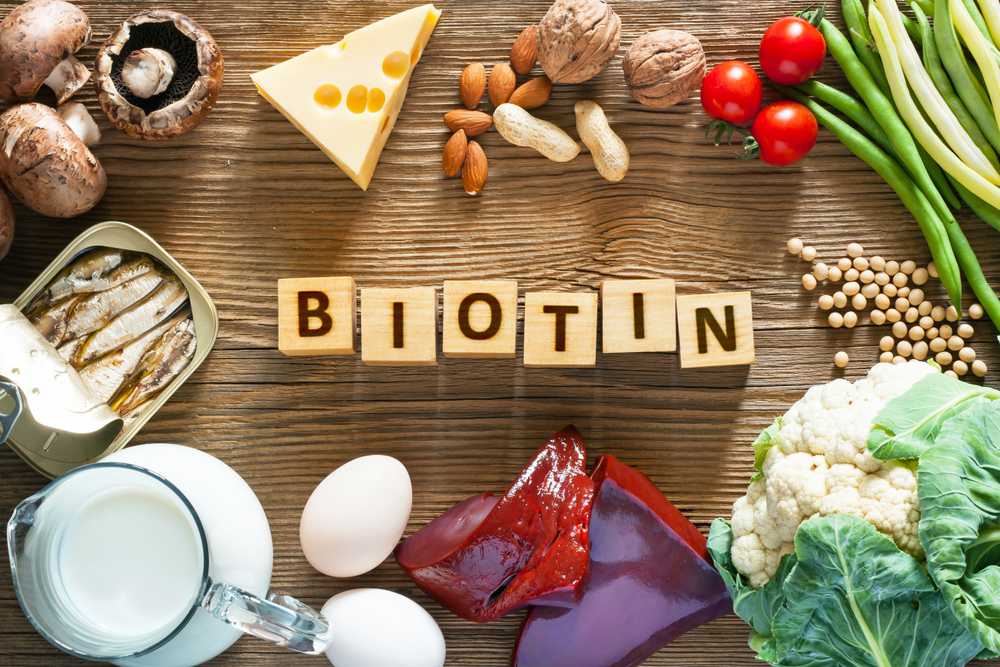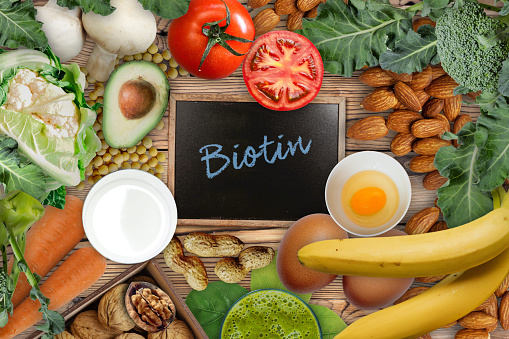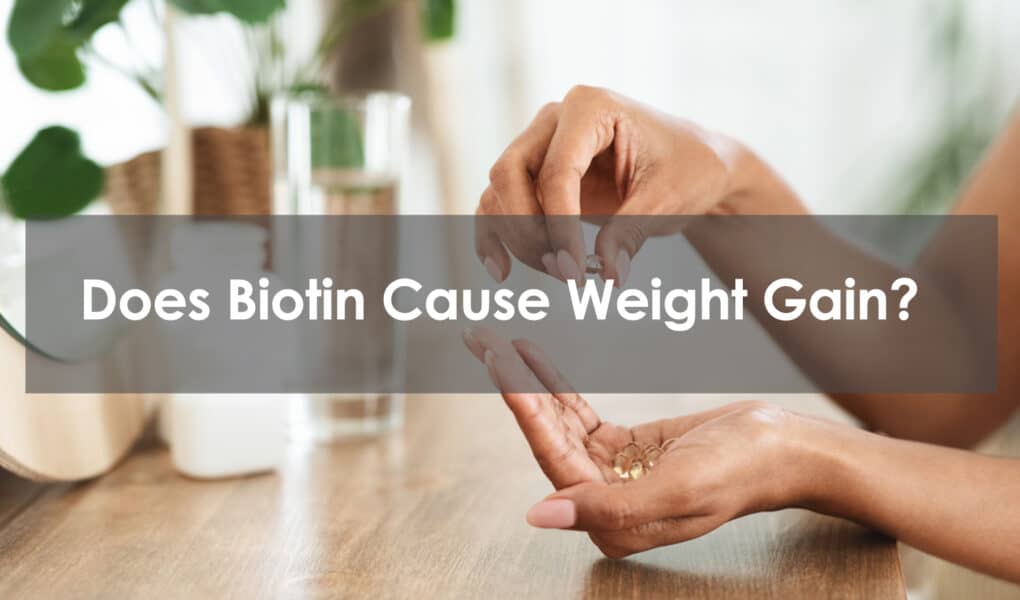Biotin, or vitamin B7, is a vitamin that has been found to be very helpful in terms of hair health. Part of the B vitamin family, it also plays a part in turning food into energy, as well as promoting nail health. But does biotin cause weight gain? In this article, we do a deep dive to provide the definitive answer.
What is Biotin?

Biotin is another name for vitamin B7. Its main jobs in the body are to participate in the metabolizing of carbs and proteins and to help to break down fats for energy. As a result, it is an essential nutrient for energy.
Biotin is classified as an essential B vitamin. That is because the body cannot function optimally without it. It is a water-soluble vitamin.
You can get sufficient amounts of biotin from foods so that the majority of people will not need to take a biotin supplement.
Health Benefits of Biotin

Biotin is needed for the body to produce energy and function properly. In addition to the body’s energy system, biotin is claimed to promote healthier hair, healthy skin, and nail growth.
A deficiency of biotin may cause such conditions as hypoglycemia, hyperlipidemia, and glucose control.
Biotin is often promoted as being able to improve the health of a person’s hair and nails. Even though there is plenty of anecdotal evidence that this is the case, there is, to date, limited research to back up these claims of enhanced hair health.
In one study, biotin supplementation was shown to have a marked improvement in men’s ability to grow their head hair after three months of use. However, it was noted that the growth of a person’s hair may be due to a number of factors. As a result, it was not possible to identify that the biotin supplementation was the sole contributing factor to hair growth.
It was also noted in this study that all of the people who experienced hair growth suffered from alopecia.
Biotin has also been claimed to strengthen brittle toenails and fingernails. It has also been touted as being able to help people who suffer from diabetes and Multiple Sclerosis. Once again, however, there is no research to back up these claims.
Biotin supplement manufacturers regularly make claims about the benefits of their products that cannot be substantiated by scientific evidence. You should, therefore, be wary of such claims.
Best Foods for Biotin

Biotin is found in many everyday food items. The richest sources of biotin are egg yolks, white mushrooms, oats, sweet potatoes, spinach, wheat germ, cheese, pork, and apples.
A single egg yolk, when cooked, will provide 53 micrograms of biotin. That is nearly double the amount that the National Institutes of Health recommend we consume on a daily basis.
Potential Side Effects of Biotin
At this stage, there have not been any identified side effects when a person takes biotin under the supervision of a medical professional or through over-the-counter purchases.
Anecdotal evidence suggests that supplementation with biotin may cause some people to other from insomnia, and stomach problems and it may affect the natural release of the hormone insulin.
Biotin deficiency, while possible, is very rare. Smoking and excessive use of alcohol have been identified as contributors to low levels of biotin. Raw eggs have also been identified as possible contributors to lowered levels of biotin.
The symptoms of biotin deficiency include losing one’s hair, elevated cholesterol levels, skin rash, and irregular heartbeat.
Biotin Daily Dosage

The recommended daily intake for biotin has not been set by the US Food and Drug Administration. However, the National Institutes of Health have given guidance on this matter. The recommendation is that adults should consume 30 micrograms (mcg) of biotin every day. They add that this should be able to be obtained through a normal diet, there is no need to take a biotin supplement.
If you check on the product label for most biotin supplements, you are likely to CA daily recommended intake of around 5 milligrams (mg). That represents 5000 micrograms, which is a whole lot more than the NIH recommendation.
The long-term effects of biotin supplementation are unknown.
If you are taking other medication, check with your healthcare provider before supplementing with high doses of biotin.
So, Does Biotin Cause Weight Gain?

Some people wonder whether biotin will cause a person to gain weight. While there have been no research studies to indicate that this is the case, there have been quite a few anecdotal reports where people have linked weight gain to excess biotin intake.
People have found that increasing their biotin levels through supplementation has led to an increase in their appetite. This has caused them to eat more and subsequently gain body fat. Other people have not had this experience.
Another reported side effect of taking extra biotin is acne, especially on the face. Again, there is no research to show that acne is a side-effect of taking extra biotin.
The best advice we can give on this matter is if you are taking biotin to reverse hair loss, for brittle hair, itchy skin, or weak nails, pay careful attention to your appetite level. If you notice that you are suddenly getting more hungry, you may have to reconsider your use of biotin as a supplement.
Keep in mind that, as I have been stating throughout this article, you will be meeting your daily biotin needs if you are following a healthy diet. So, high-dose biotin supplementation is probably not needed. By eating more eggs, oats, dairy products, wheat germ, and vegetables, you’ll be able to get a good supply of this essential B vitamin without the risk of weight gain.
Conclusion
Bition, or vitamin B7, is an essential vitamin that the body needs to produce energy and function optimally. There are many sources of biotin in the foods we eat. As a result, is unlikely that you will need to take a biotin supplement.
While there is no research indicating that biotin causes weight gain, many people have noticed that it leads to an increased appetite. Because of this, and the fact that you can get enough of it from food sources, we do not recommend taking biotin as a dietary supplement.
Frequently Asked Questions
How much Biotin should I take?
It’s recommended that adults consume 30 mcg daily.
Can a person actually be deficient in Biotin?
Biotin deficiency is very rare but it is possible. It is usually the result of a genetic deficiency. Some of these conditions may result in the loss of hair and overly brittle nails. Smoking and alcohol abuse contribute to low levels of biotin.
Should a pregnant woman take biotin?
Biotin has been shown to promote proper fetal growth, which makes it a valuable supplement for pregnant women. Babies that are born early are also known to be low in biotin, so supplementing with this vitamin may be a good idea. Check with your medical professional before supplementing during pregnancy.







